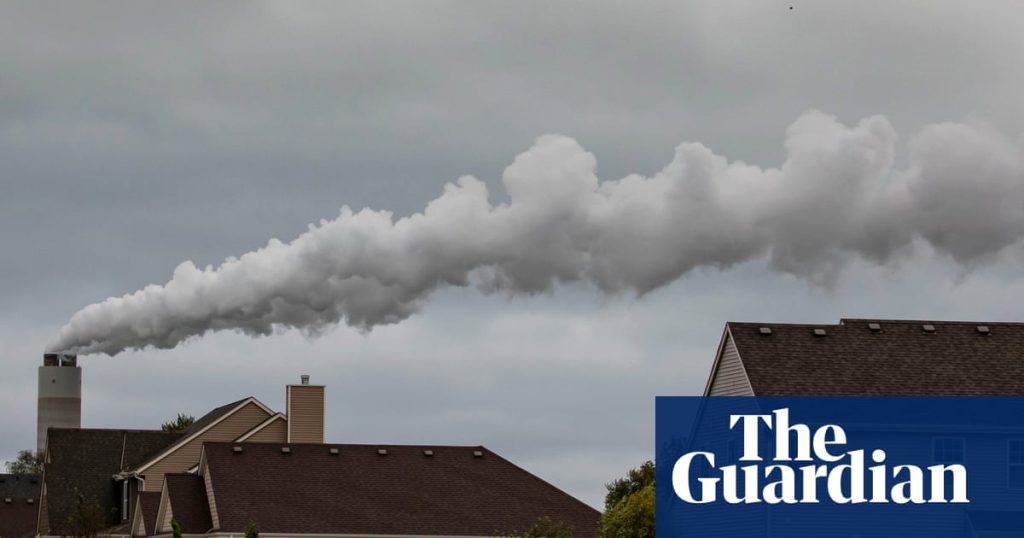Fifteen young climate advocates, aged eight to 17, on Friday sued the state of Wisconsin over its pro-fossil fuel policies.
The case provides the opportunity for state officials to “make the correct step to decarbonize Wisconsin” because of the “climate harms they’ve caused youth”, said Kaarina, 17, who is the lead plaintiff in the lawsuit.
Kaarina grew up in the state’s Vernon county along the Mississippi River. But in 2023, a large boulder rolled into her backyard and knocked over trees.
Concerned for their safety, her family decided to relocate, but could not find an affordable home in the county that was safe from floods, which the climate crisis has made more common and severe. They were forced to move an hour north to La Crosse county.
Incidents like the one Kaarina experienced are occurring more frequently in Wisconsin, as winter thawing and subsequent refreezing cycles, known as “freeze-thaw events”, are increasing due to global heating. If it weren’t for the fossil fuel-driven climate crisis, Kaarina believes, her fate might have been different, as the boulder that tumbled toward her home would probably have never become dislodged.
“I had to move away from the childhood I planned to live in my entire life and enjoy with my own children,” said Kaarina, who is using only her first name because she is a minor.
The “incredibly traumatic and life-changing experience” helped inspire her to join the case, she said.
The new lawsuit was filed by two non-profit law firms. The first, Our Children’s Trust, notched a landmark 2023 win in a Montana case when a judge ruled that the state’s pro-fossil fuel policies violated young challengers’ state-given rights. The second, regional environmental justice law center Midwest Environmental Advocates, won a July case concerning Wisconsin public records law.
In the new lawsuit, plaintiffs are specifically targeting two Wisconsin laws governing the state’s public service commission, which regulates utilities. One prohibits the regulator from considering toxic and planet-heating air pollution when permitting new fossil fuel power plants, while another bars it from requiring utilities to increase the amount of electricity they obtain from carbon-free sources.
“These laws set up a system where the public service commission continues to approve fossil fuel power plants and cannot bring online more renewable energy,” said Nate Bellinger, supervising staff attorney at Our Children’s Trust.
Wisconsin has pledged to transition to 100% carbon-free electricity by 2050, but today still obtains three-quarters of its electricity from fossil fuels.
“The state legislature and the executive branch have both set goals and mandates to decarbonize the electricity sector,” said Bellinger. “These laws are getting in the way of that.”
The plaintiffs are aiming to have the two laws declared unconstitutional, which could ultimately lead to their overturning. The state’s constitution enshrines a right to life, liberty and the pursuit of happiness, which the perpetuation of an oil and gas-based electricity sector impinges upon, the lawsuit argues.
“We’ve argued that the fossil fuel pollution and climate impacts resulting from the approval of fossil fuel power plants is harming the plaintiff’s health, their homes, their property and their safety, and ultimately violating those constitutional rights to security and health,” Bellinger said.
The planet’s most important stories. Get all the week’s environment news – the good, the bad and the essential
Privacy Notice: Newsletters may contain info about charities, online ads, and content funded by outside parties. For more information see our Privacy Policy. We use Google reCaptcha to protect our website and the Google Privacy Policy and Terms of Service apply.
after newsletter promotion
The challengers also say the constitution’s invocation of the public trust doctrine, which requires certain natural resources to be held in the government’s trust for the public’s benefit, should force Wisconsin to protect navigable waters for present and future generations, including from the climate crisis.
Climate impacts on Wisconsin are mounting, including not only flooding and rapid freeze-thaw cycles but also wildfires, ecosystem degradation and increasing extreme heat. Each of these is taking a toll on local youth, the lawsuit says.
“I coached tennis during the summer, but I recently did have to give it up due to such extreme weather and extreme climate events that don’t make it safe for me to be outside any more,” said Kaarina. “Also, my family enjoys gardening at my grandparents’ tree farm nearby, and my summers in the gardens have been cut short due to such extreme heat that does not make it safe to be outside, and extreme weather events that ultimately washes away the gardens that we’ve put so much incredible work into.”
Plaintiffs have also experienced asthma worsened by the burning of fossil fuels, while Indigenous challengers have seen their access to traditional foods hampered by ecosystem degradation and warming waters, the lawsuit says.
“Our clients are asking the court to uphold their right to a livable future,” said Tony Wilkin Gibart, executive director of Midwest Environmental Advocates. “This case is about whether they will inherit a future shaped by clean energy and a stable climate – or one burdened by fossil fuel pollution, extreme weather events, and growing threats to their health and safety.”
The lawsuit comes as the federal government rolls back a slew of environmental rules and worked to boost fossil fuels. In May, Our Children’s Trust sued the Trump administration for some of its anti-environmental executive orders; the case will have a two-day evidentiary hearing next month.
Donald Trump’s policies have made youth climate action even more important, particularly at the state level, said Kaarina.
“There’s very many dark things going on in our world right now, and especially in our federal government,” she said. “However, I don’t think that that should squish the light that is in youth.”

